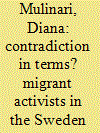|
|
|
Sort Order |
|
|
|
Items / Page
|
|
|
|
|
|
|
| Srl | Item |
| 1 |
ID:
164303


|
|
|
|
|
| Summary/Abstract |
Right-wing, xenophobic and racist parties have enjoyed immense successes in Europe in recent decades. In Sweden, the third-largest party in Parliament is the Sweden Democrats (SD), with 13% in the 2014 general election. Sympathy for the SD among foreign-born Swedish citizens, both women and men, is far lower than among Sweden-born men, but an increasing number of Swedish citizens with migrant backgrounds support the party. The aim of this article is to explore the subject positions open for citizens with migrant background in the Swedish public space with special focus on the identities and worldviews developed by migrant activists who have joined the SD party and are, to differing degrees, racialised and perceived as non-Swedish. Using the concept of migrant respectability, this research is intended to understand why and under what circumstances migrants chose to join and represent a xenophobic and racist party.
|
|
|
|
|
|
|
|
|
|
|
|
|
|
|
|
| 2 |
ID:
172448


|
|
|
|
|
| Summary/Abstract |
This article provides a close reading of two popular Egyptian action films, al-Almani (The German, 2012), the first blockbuster since the 25 January 2011 revolution, and Qalb al-Asad (Lion heart, 2013), both starring Muhammad Ramadan as a socially produced proletarian “thug” figure. Made for Egyptian audiences, the films privilege entertainment over aesthetics or politics. However, they express distinct messages about violence, morality, and revolution that are shaped by their moments of postrevolutionary release. They present the police state in salutary yet ambivalent terms. They offer a rupture with prerevolutionary cinema by staging the failure of proletarian masculinities and femininities that rely on middle-class respectability in relation to sex, marriage, and work. Even as each film expresses traces of revolutionary upheaval and even nostalgia, cynicism rather than hopefulness dominates, especially in al-Almani, which conveys to the middle and upper classes the specter of an ever-present threat of masculine frustration. The form and content of Qalb al-Asad, by comparison, offer the option of reconciling opposing elements—an Egyptian story line with a less repressive conclusion if one chooses a path between revolutionary resistance and accepting defeat.
|
|
|
|
|
|
|
|
|
|
|
|
|
|
|
|
| 3 |
ID:
171863


|
|
|
|
|
| Summary/Abstract |
Women in prostitution are often disrespected and subject to health risks. The aim of this study is to explore how women formerly engaged in prostitution in Sri Lanka position themselves in relation to gendered norms of respectability, and to discuss the possible implications for their sexual and reproductive health and rights (SRHR). Semi-structured qualitative interviews were conducted with fifteen women formerly engaged in prostitution. Discourse analysis was used to identify and describe interpretative repertoires and four repertoires were identified: Victimhood, Resistance, Responsibility, and Independence. The first three were drawn upon to construct their identities in line with norms of female respectability, as the women emphasised being victims of unfortunate situations, resisting sexual disrespectability and taking responsibility for their children and others. The last repertoire deviated from the respectability norm as it conveyed a picture of the women as independent, strong and courageous subjects, characteristics more in line with male respectability in Sri Lanka. Despite marginalised and oppressive circumstances, the women drew on interpretative repertoires to enhance access to respect, dignity and resources. However, their vulnerability to violence, SRHR risks and virtual absence of rights leave them with little access to resources that could enable a healthier and better life.
|
|
|
|
|
|
|
|
|
|
|
|
|
|
|
|
| 4 |
ID:
159521


|
|
|
| 5 |
ID:
181053


|
|
|
|
|
| Summary/Abstract |
This article explores a unique type of songs performed by a Black minority musical group in southeastern Tunisia. Taifa, a group of Black singers, mainly from the rural working class appeared as a response to the economic marginalization of Blacks after the abolition of slavery in Tunisia in 1846. It explores the way this musical group developed and how it came to be associated with the norms of respectability among the local society. It also delves into the themes of Taifa songs that, I contend, show an incremental journey of integration into the predominant Arab/Berber majority and an adjustment to Tunisia’s social and political changes, which were reflected in the changes in the themes of Taifa songs after the Tunisian Revolution.
|
|
|
|
|
|
|
|
|
|
|
|
|
|
|
|
| 6 |
ID:
114638


|
|
|
|
|
| Publication |
2012.
|
| Summary/Abstract |
This article investigates how women who have come to the United States as brides of South Asian professionals use threading, a hair removal method, as a home business to negotiate new challenges they face as newly immigrant women. Based on participant observation and in-depth interviews, the article focuses on how these young women combine their expected roles as wives and mothers in a new country with their own aspirations to win the respect of spouses, in-laws and children via threading. The article demonstrates how these women find meaning and identity through threading and evidences how they negotiate respectability by stressing their connections to home and domestic roles even as they dissociate themselves from beauticians who work at salons. Although they disrupt extant notions of 'good wives and mothers', these women nevertheless articulate this disruption within existing models and, more often than not, desire to be the bahu that their mothers-in-law admire.
|
|
|
|
|
|
|
|
|
|
|
|
|
|
|
|
|
|
|
|
|